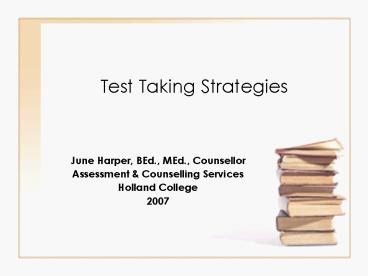Test Taking Strategies - PowerPoint PPT Presentation
1 / 21
Title:
Test Taking Strategies
Description:
Flash cards. Plan a strategy. Do a dry run. Ask the instructor what to expect ... What to do DURING the test. Let go of test anxiety. Answer the easiest, ... – PowerPoint PPT presentation
Number of Views:1095
Avg rating:3.0/5.0
Title: Test Taking Strategies
1
Test Taking Strategies
- June Harper, BEd., MEd., Counsellor
- Assessment Counselling Services
- Holland College
- 2007
2
What to do BEFORE the test
- Manage review time
- Daily reviews
- Weekly reviews
- Major reviews
3
Create Review Tools
- Study checklists
- Mind map summary sheets
- Flash cards
4
Plan a strategy
- Do a dry run
- Ask the instructor what to expect
- Get copies of old exams
5
As you begin
- Arrive early
- Attention to verbal directions
- Read the directions slowly
- Jot down memory aids
6
What to do DURING the test
- Let go of test anxiety
- Answer the easiest, shortest questions first
- Next answer multiple choice, true/false, and
fill-in-the-blank questions. - Pace yourself
- Leave plenty of space
- Look for answers in other test questions
7
Quick-answer questions
- Multiple choice, true/false
- First instinct is best
- Only change your answer if you think your first
answer is wrong because you misread the question
8
Multiple choice questions
- Check the directions
- Answer each question in your head
- Be sure to read all answers
- Guessing
9
True/false questions
- Answer questions quickly
- Read carefully
- Look for qualifiers
- All, most, sometimes, (never), or rarely. (The
answer will depend on the qualifier, and more
often than not, questions containing qualifiers
are true) - Absolute qualifiers (ALWAYS OR NEVER usually
false)
10
Short-answer/fill-in-the-blank tests
- Concentrate on key words and facts
- Be brief
11
Essay questions
- Make a quick outline
- Include part of the question in the answer
- Expand your answer
- Start out with the most solid points
12
FINAL POINTS
- Write legibly
- Be brief
- Use a pen
- Write on one side of the page only
- Review answers
13
Words to watch out for in essay questions
- Analyze
- Compare
- Contrast
- Criticize
- Define
- Describe
- Discuss
- Enumerate
- Evaluate
- Explain
- Illustrate
- Interpret
- Outline
- Prove
- relate
- State
- Summarize
- Trace
14
Words
- Analyze break into separate parts and discuss,
examine, or interpret each part - Compare examine two or more things. Identify
similarities and differences - Contrast show differences. Set in opposition
- Criticize make judgments. Evaluate comparative
worth. Criticism often involves analysis
15
Words
- Define give the meaning usually short
- Describe give a detailed account. Make a
picture with words, list characteristics,
qualities, and parts - Discuss consider and debate or argue the pros
and cons of an issue - Enumerate list several ideas, aspects, events,
things, qualities, reasons, etc.
16
Words
- Evaluate give your opinion or cite the opinion
of an expert. Include evidence to support the
evaluation. - Explain make the idea clear. Show logically
how a concept is developed. Give the reasons for
an event. - Illustrate give concrete examples. Explain
clearly by using comparisons or examples.
17
Words
- Interpret comment upon, give examples, describe
relationships, explain the meaning, describe,
then evaluate - Outline describe main ideas, characteristics,
or events - Prove support with facts presented in class or
from textbook
18
Words
- Relate show the connections between ideas or
events - State explain precisely
- Summarize give a brief, condensed account.
Include conclusions. Avoid unnecessary details. - Trace shoe the order of events or progress of a
subject or event
19
Predict test questions
- Get organized
- Create own code or graphic signal
- Ask instructor to describe the test, how long it
will be and what kind of questions to expect
(essay, multiple choice, etc.) - During lectures watch for test questions
- Listen for instructors clues
- Pay attention to questions the instructor poses
to students - Material from reading assignments
- Make practice test questions
- Save all quizzes, essays, lab sheets
- Obtain copies of previous exams
- Brainstorm test questions with other students
- This material will be on the test
20
Creating an Exam
- Create a short multiple choice exam
- Share your questions
- Discuss your answers
21
F is for feedback not failure
- THANK YOU































